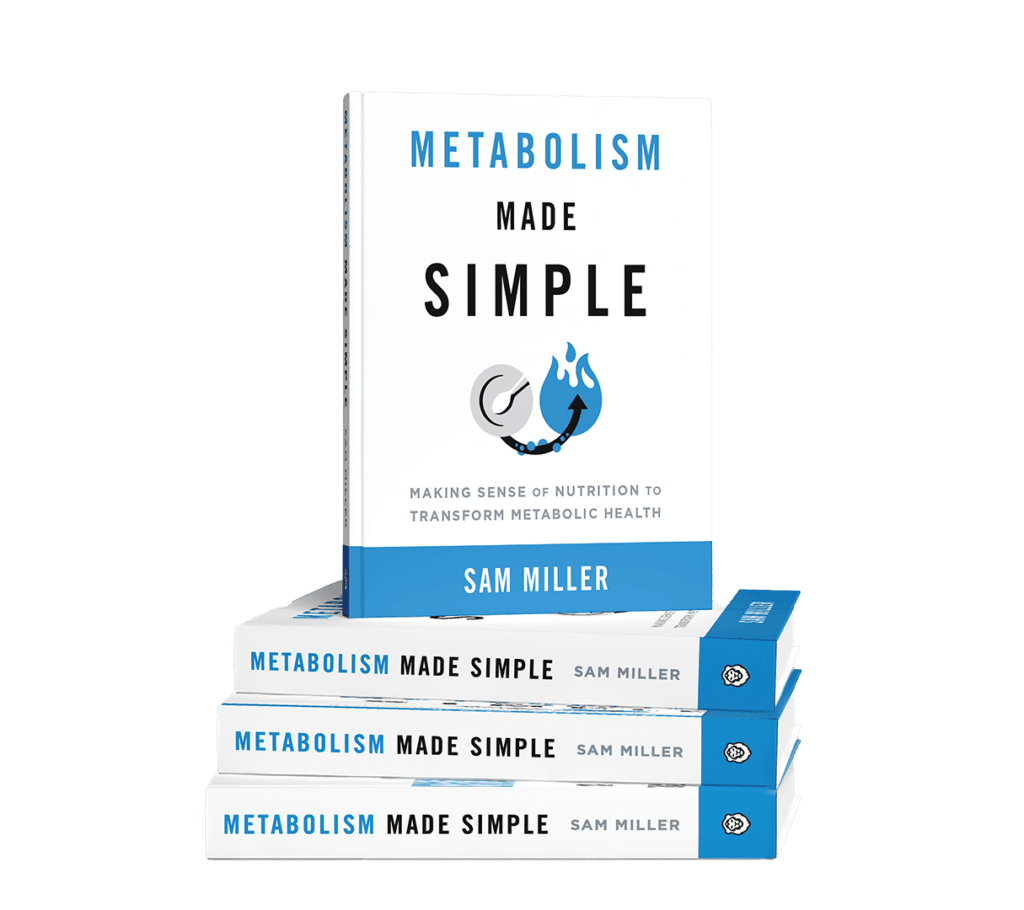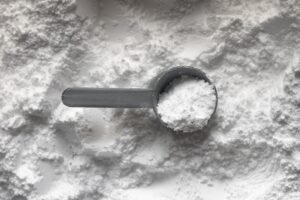Out of all of the supplements that exist in the sports nutrition world, protein powders are considered a cornerstone, and with good reason. One of the foundational aspects of sustainably achieving fat loss, building muscle mass, or really any fitness or performance goal is getting enough protein each day.
But protein powders aren’t magic; they simply make it easier for individuals to hit their daily protein targets.
However, as I browse through the fitness space on social media, I constantly see misinformation or conflicting information about certain forms of proteins. You’ll hear some people say that whey protein is inflammatory and it’ll wreck your gut, so you should avoid drinking whey protein.
Others say all plant-based protein powders can’t build muscle.
The truth is we all have unique health circumstances, so some forms of protein powder might be fine for some people but disagree with others — for example, some people have a hard time digesting whey protein isolate, whereas other people have no issues.
Today, we’re going to be demystifying many different types of protein powder to help you determine the best protein powder for you or your client. We will discuss high-level things around which might be best for building muscle mass and performance outcomes, touching on potential shortcomings of studies in this area, and then we’ll dive into a general pro/con analysis of different types of protein.
Not necessarily specifically from a muscle growth standpoint, although we’ll cover that too, but around which proteins might be better for specific client contexts; i.e. those with potential gut issues or sensitivities to dairy.
Table of Contents
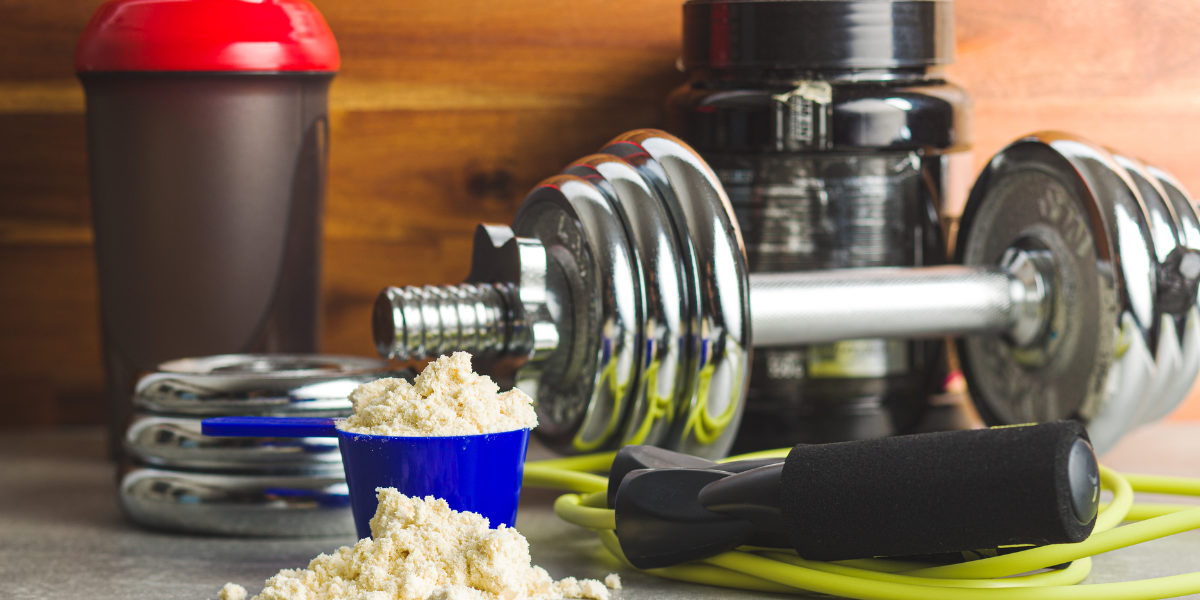
How Much Protein Powder Should You Drink Daily
A very common question that I see people asking their fitness coaches, or just generally on the internet, is how much of one’s daily protein should be coming from powders.
First though, how much protein should you consume each day?
The amount of protein you should consume daily can vary based on factors such as age, sex, weight, activity level, and fitness goals. The recommended daily amount of protein intake is set to 0.8 grams of protein per kilogram of body weight per day.
However, this is only to prevent deficiency and new research indicates that this is even too low for sedentary individuals. To get the maximum muscle growth stimulus, we should consume between 1.8 grams per kg/day and 2.2 grams per kg/day.
Once you determine your or your client’s protein needs, you need to determine how much protein powder is suitable. This is, of course, an individualized question based on gastric tolerance. Some people do just fine with 1 or 2 scoops a day but once they start taking in 3 or 4, they get some gastric issues.
Barring those types of circumstances, I generally let beginner clients get up to 50% of their daily protein intake from a powder, trying to work it down a bit from there as they get used to living a healthier lifestyle.
Of course, there may be other situations where individuals would have to have a higher protein intake from protein powders. These would be people like a physique athlete pre-contest whose calories are too low to feasibly get in the protein they need without going over their caloric limit.
In other cases, though, we’re missing out on a lot of quality micronutrition if we’re constantly getting that much of our protein from a powder, so the general recommendation is that it’s okay to use protein powder to hit your protein target, but you should also aim to get the majority of your protein intake from whole foods.

What is the Best Protein Powder for Building Muscle
Another common question I hear a lot is probably a question that everyone has had on their mind at some point in their health and fitness journey: Which protein source is the best to build muscle and optimize performance?
I don’t mean to burst your bubble if you were expecting a huge battle here, but the short of it is that current research indicates pretty much any protein powders (whey protein isolate, casein, or plant-based protein powder, etc.) are solid in terms of outcomes data if certain criteria are met.
Let me explain what I mean when I say that.
When you’re looking at the scientific literature, there are a lot of ways to measure the effects of protein intake. The two most common ways are looking at acute muscle protein synthesis rates after ingestion and then looking at outcomes data, meaning putting cohorts through a resistance training program and supplementing X protein vs. Y protein and seeing which led to greater increases in lean muscle and performance.
The first thing to realize is that muscle protein synthesis studies are not equal to studies that actually test outcomes. Muscle protein synthesis is just one factor in muscle building. If you just look at muscle protein synthesis studies, whey protein powder consistently shows the highest acute response compared to other protein sources.
When you look at actual muscle mass outcome studies that compare protein powders, they show largely the same results over the course of a resistance training study, even in the more controlled studies.
For example, there are many studies where other variables, like the rest of the diet, sleep, etc., aren’t controlled. It’s quite expensive to rigorously control a study — giving someone all their meals and making them live in a facility to monitor sleep isn’t exactly feasible in the majority of studies. The researchers generally just tell participants to maintain their current dietary practices, and they might have them log their food a few days a week to get a representative sample of what they’re taking in.
However, even in the studies where researchers make sure calories and amount of protein from the rest of the diet are controlled, we still see similar outcomes in terms of whey protein vs. casein protein vs. egg white protein vs. plant-based protein, provided that the plant-based protein powder blend has a complete amino acid profile and a decent amount of leucine.
This brings up another point: You do have to make sure there’s a good amount of all of the essential amino acids and leucine in whichever protein powder you choose to drink. Whatever you think is the best protein isn’t going to be as beneficial as you hope if there isn’t enough leucine in it.
This mainly applies to plant-based proteins, which require blends to achieve get adequate amounts of leucine. Usually, a rice/pea blend provides a complete profile and is the best protein choice for those looking for a plant-based protein powder. I’ve also seen pea/yeast protein blends recently that look fairly complete.
There are also issues with the outcomes studies, though. Usually, these are just 6, 8, or 12-week studies. We know muscle building is a fairly slow process, so even though the research doesn’t show significant differences within those time periods, we may start to potentially see some if these studies get drawn out longer to, say, 6 to 8 months or so.
Perhaps we wouldn’t, I’m not sure because there aren’t any very long, well-controlled, randomized controlled studies looking at this stuff.
The take-home is that, in all likelihood, any protein powder that contains all of the essential amino acids and around 2–3 g of leucine per serving would work to build muscle, lose weight, or achieve any other fitness goal. Fortunately, most quality protein powders out there these days, regardless of type, meet these requirements.
However, maybe, just maybe, if we favor the proteins that have the highest leucine content as well as the highest bioavailability, like whey protein powder, we might see the tiniest fraction of a difference in our lean muscle mass over the course of a year — probably 1% or under, but that’s yet to be determined.
One additional note before we get into a pro/con and comparison conversation. I’ll be talking about collagen protein here too, but for the purposes of building lean muscle, collagen simply doesn’t make the cut because it lacks the correct amino acids for a sufficient hypertrophy response.
How to Choose the Best Protein Powder
The protein powder market has tightened up a lot in the past several years thanks to increasing consumer savviness. In the 90s and early 2000s, we had a lot of issues with amino acid spiking and other potential impurity issues from supplement companies, and I’d venture to say that 80% of plant-based protein powders that weren’t soy based at the time didn’t have a complete blend.
The overall quality of powders on the market overall has increased substantially, but there are still a few things we have to watch out for, particularly around plant-based proteins.
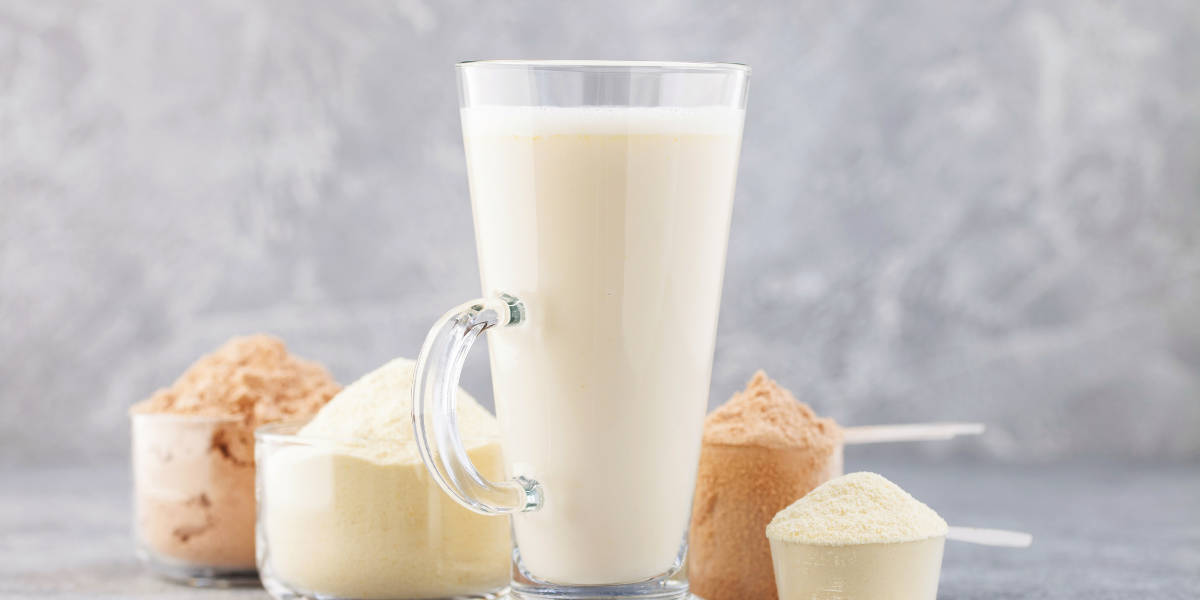
Types of Whey Protein Powder
Let’s start out with probably the most well-known protein powder out there: whey proteins.
Whey protein is a high-quality protein derived from milk during the cheese-making process. It’s a complete protein, meaning it contains all nine essential amino acids that the body cannot produce on its own and we must get from our diets. Whey protein is one of the two main proteins found in milk, the other being casein.
Yes, whey protein powder is fast digesting and is best known for being the “best protein” for drinking post-workout thanks to this. Again, consider the discussion we just had as far as muscle protein synthesis vs. outcomes data. Whether you choose whey protein powder or another form doesn’t seem to matter a huge amount in the grand scheme of things.
In any case, let’s discuss different forms, the main types of whey protein powder being concentrate, isolate, and hydrolysate.
Most people in the fitness industry opt for a whey isolate because of its superior macro profile, a higher percentage of protein per serving, and it’s a good medium in terms of price compared to whey protein concentrate, which is cheaper, and hydrolyzed whey, which is more expensive.
However, a lot of people aren’t aware that whey protein concentrate has a lot of unsung beneficial properties, so let’s go over the pros and cons of concentrate compared to other forms of whey protein powder.
After reading the pros and cons of each, you can decide for yourself which is the best protein powder for you.
Whey Protein Concentrate
If you’re an individual who tries to eat a minimally processed diet, whey concentrate would be the best protein powder choice for you. It is the least processed of the three types of whey proteins, and it’s basically just liquid whey that’s had the liquid evaporated from it along with a minor filtration process.
The main con of whey protein concentrate is that it has a smaller percentage of protein and has slightly more fats and carbs in it, so if someone is in a situation where their calories are lower, then they might want to opt for a whey protein isolate.
Unsung Health Benefits of Whey – Lower Blood Pressure and More
However, whey concentrate retains all or most of the micronutrients that liquid whey contains. These include things like immunoglobulins, alpha-lactalbumin, several different lactoferrins, and many others.
These particular fractions have shown numerous health benefits in studies. For example, a-lactalbumin has decently strong ace-inhibitory activity, meaning it can potentially help with high blood pressure or hypertension.
Some isolates and hydrolysates may have a bit of alpha-lactalbumin present as well, depending on the manufacturing process, but whey concentrate has more.
A whey concentrate that is around 80–85% protein per serving will have around 11–20% of it as immunoglobulins as well, which have immune system-modulating properties. Many animal studies have looked at whey protein concentrate immunoglobulins and the immune response, and we generally see a more anti-inflammatory profile of immune cell type and activity after consumption.
For instance, in a study conducted on mice, researchers found that giving them whey protein concentrate led to lower levels of certain substances in their blood, including inflammation-related molecules (IL-1α, IL-1β, IL-10, TNF-α), harmful reactive oxygen species (ROS), and cholesterol. Whey protein isolate did show effectiveness here too, but not as much, but that was probably through a different mechanism, which we’ll go ahead and address.
Another great thing about whey protein, in all of its forms, is that it has been shown to significantly improve glutathione levels in the body. Glutathione is one of the body’s master antioxidants, and increasing glutathione production within the body is extremely helpful for inflammation.
Whey is very high in both cysteine and glutamate; two amino acids necessary for the production of glutathione, and cysteine is generally considered to be the rate-limiting amino acid for synthesis. In that other mouse study that I just referenced, the whey protein isolate group that saw positive anti-inflammatory effects probably did so because of increased glutathione, whereas whey concentrate has the benefit of the immunoglobulins plus the glutathione-raising effect.
Both animal and in vitro studies have also shown that whey concentrate can improve intestinal permeability and the mucosal immune profile in the gut as well. There are also a few human studies looking at whey concentrate on psoriasis outcomes, and those participants who took the whey had significantly improved psoriasis symptoms.
A potential con about whey concentrate, though, is that if someone is sensitive to dairy, they’re most likely going to be sensitive to whey concentrate since it does contain more dairy components than whey isolate or hydrolysate.
Even though I listed out a lot of potential benefits of why protein concentrate there, if you know you get bloated and you can’t stop passing gas after having whey protein concentrate, then it’s either probably not the best protein option for you or you have a lower quality brand.
There is less of a chance that someone would be sensitive to whey protein isolate or whey protein hydrolysate since many of the other dairy fractions have been removed.
Whey Protein Isolate and Hydrolysate
As far as isolate vs. hydrolysate goes, this one’s really splitting hairs.
Hydrolyzed whey boasts a higher protein percentage, but that’s about it. It usually tastes a lot worse, too, and is significantly more expensive. Unless you’re very calorie-restricted and need a higher protein percentage per calorie, it’s probably best to skip pure hydrolysate.
One of the key benefits of whey protein isolate is that it typically contains a high percentage of protein (around 90% or higher) with minimal amounts of fats and carbohydrates. This high protein content makes it an efficient and effective way to meet daily protein requirements, especially for those who are consuming fewer calories because they are in a fat-loss phase.
Additionally, whey protein isolate is quickly digested and absorbed by the body, providing fast delivery of amino acids to the muscles. This makes it an excellent option for post-workout recovery, helping to support muscle repair and growth.
Many individuals also choose whey isolate protein powder because it is a complete protein, meaning the protein powder contains all nine essential amino acids that the body needs to function properly.
That wraps the discussion with whey. The take-home here is that all forms of whey protein powder are great and beneficial.
If you’re quite calorie-restricted, then an isolate and hydrolysate protein powder would be the way to go. You’ll still get the additional glutathione-raising benefits. If you don’t mind the extra few grams of fat and carbs and aren’t sensitive to dairy, whey concentrate protein powder is totally viable as well for the extra micronutrients, and your wallet will thank you too.
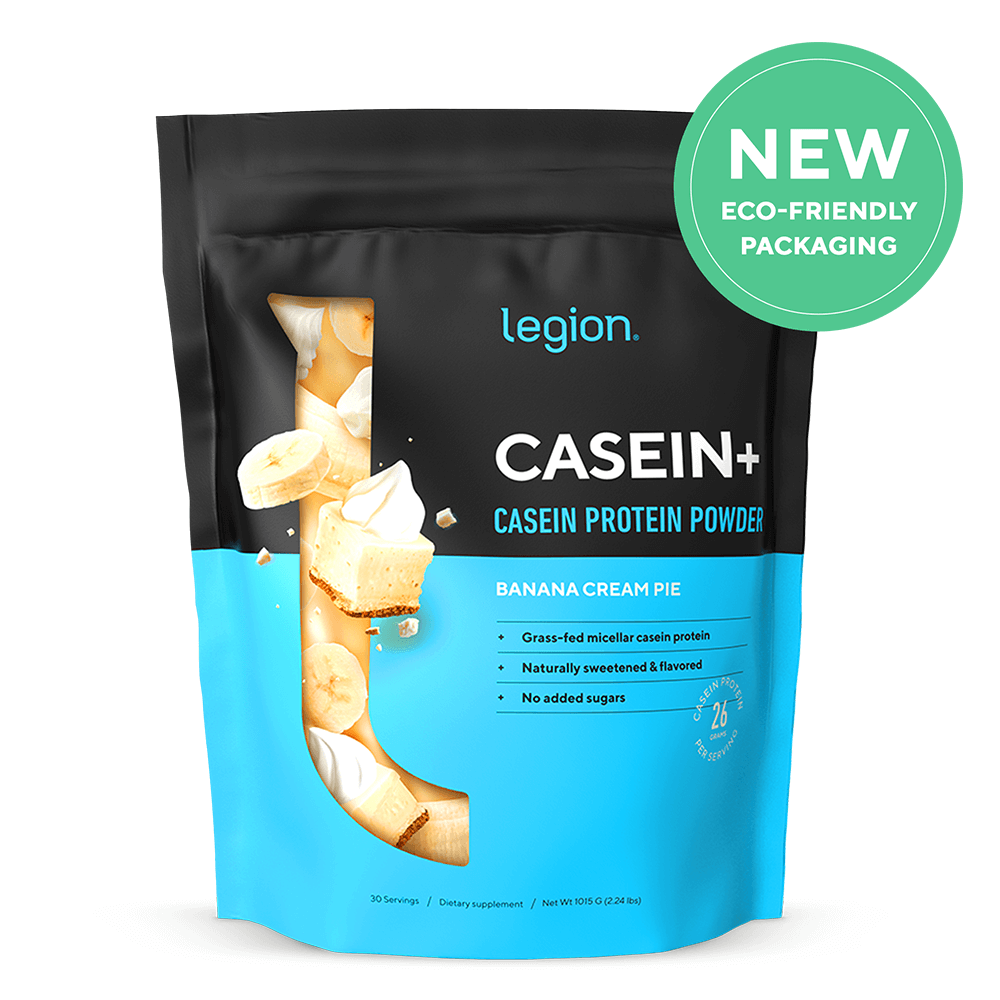
Casein Protein Powder
Casein protein powder has been another popular supplement that was originally marketed as the “pre-bed” protein since it has a longer digestion time, resulting in a “trickle” of amino acids into the bloodstream. This remains true to some extent, but in actual data, you still see a peak after 60 minutes of ingestion, with a slower fall-off than whey. Overall though, blood amino acid concentrations don’t get back to baseline until about 4 hours later.
However, if you actually look at the amino acid kinetics of a mixed meal of steak, vegetables, and a carb source, amino acid levels don’t reach baseline till 6+ hours later. Even though casein has been strongly marketed as a slow-digesting protein, a mixed meal with meat will be digested even slower.
In any case, a major con of casein is that it’s one of the major portions of dairy that folks can be sensitive to. I’ve heard many anecdotes in the fitness space that people who tolerate a whey isolate protein powder just fine get pretty bad digestive distress from casein.
In terms of literature looking at the above, we can look at a study of hydrolyzed casein vs. micellar casein in individuals with IBS. The micellar casein elicited a significant increase in symptoms, whereas the hydrolyzed casein did not. Hydrolyzed casein isn’t exactly popular on the market yet, and is quite expensive, so I would just say if you have gut issues, it’s best to skip casein altogether.
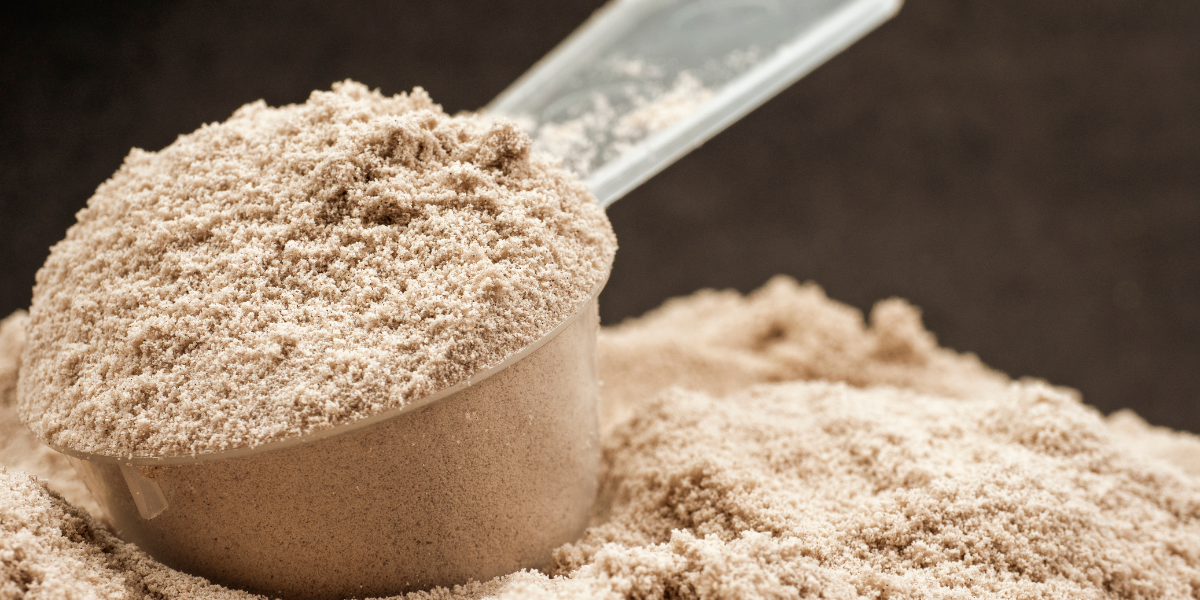
Plant-Based Protein Powder
Plant-based protein powder options can be a very viable alternative to dairy-based options if someone needs to completely cut out dairy from their diet.
About 10-15 years ago, you really had to be a label reader on plant-based protein powders to ensure they had a complete amino acid profile, but more companies are including the necessary pea/rice blend these days since more consumers are aware of the importance of a complete amino acid profile.
That doesn’t mean you shouldn’t check the label, though; there are still many products out there that are trying to cut corners. As a reminder: Ideally, we’d look for a protein powder that has 2–3 g of leucine per serving.
One concern that popped up several years ago is the degree of heavy metal contamination in vegan protein powders. The Clean Label Project tested a vast amount of protein powders of all kinds, and 75% of the plant powders tested had levels of lead, BPA, mercury, cadmium, and arsenic that were nearly double the amounts allowed according to guidelines.
That study wasn’t entirely clear on the clean brands, but I’d encourage you to use third-party sites like Labdoor and Consumer Lab to check the purity of the product or email and ask the manufacturer for a certificate.
A question I’ve heard among savvy folks is about the potential presence of anti-nutrients in plant protein powders that are normally found in plants. The good thing is that you don’t necessarily have to worry about this. Early versions of pea and soy protein had decently high levels of phytate that came with it, but thanks to new processing methods, including the use of microbial fermentation and enzymatic modification, any anti-nutrients present have been taken out of the finished protein powder.
One last con about plant protein powders is the taste. It’s pretty darn hard to get a plant protein blend to taste awesome. There are some brands out there that have done it, but it’s usually best to go with the chocolate flavor or something with a lot more flavor to it than vanilla since that will generally mask the poor taste of protein itself. The best-tasting, highest-quality plant blend that I’ve come across is Legion’s Plant+ (Code SAM).
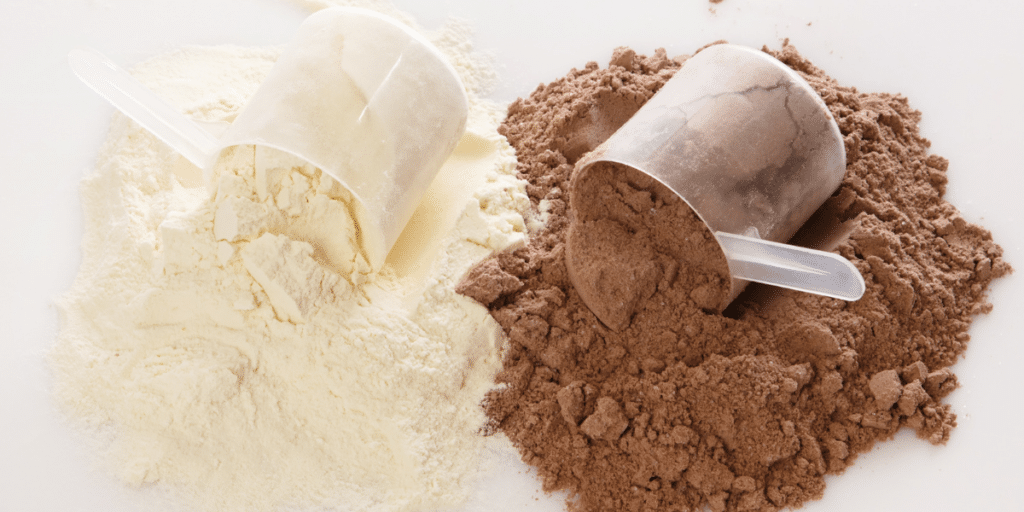
Soy Protein Powder
Let’s also address pure soy protein powders really quickly because there are a lot of myths floating around about them.
Soy protein powder is considered a complete protein source, yes, but it is generally lower in leucine than other sources. Pea/rice blends in the correct ratios can get closer to whey in terms of leucine content than soy by itself. We also even see lower muscle growth over time with soy vs. whey, for example.
The main concern I hear people talking about is the feminizing effects of soy protein powder in males, and this has largely been debunked, so men don’t necessarily have to worry about getting enlarged breasts from eating soy protein or drinking soy protein powder in reasonable amounts.
The phytoestrogens (estrogen-like compounds) in soy can potentially be beneficial for postmenopausal women as well, although studies are somewhat conflicting on that topic.
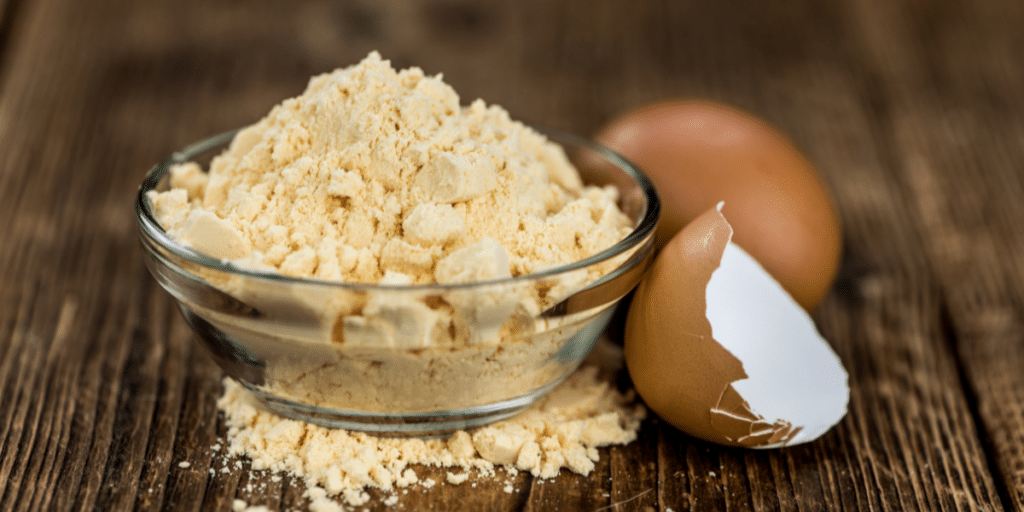
Egg Protein Powder
The last type of protein powder we’ll address in full is egg protein powder.
One of the pros here is that it boasts the second highest bioavailability when compared to whey, but again, in terms of outcomes data, this may not seem to matter quite as much in the context of an overall protein-rich diet.
Egg protein powder was one of the first true protein powders developed in the mid-1900s and remained the earlier bodybuilder’s protein of choice for its superior quality back in the day. Its superior bioavailability is pretty much where the pros end, though.
As far as the cons of egg protein powders, we’ll start with the basics. The taste and texture of egg protein aren’t exactly pleasant for most. Since it’s basically just powdered egg whites, people describe it as rather slimy once mixed with water, particularly if it’s pure egg protein and not a protein powder blend.
Egg white is also another common intolerance that those with gastrointestinal issues or autoimmune diseases can have, so for many in that population, egg protein is going to be out.
Pure egg white protein is also incredibly expensive. Just 1 pound of egg white protein will run you around 40 bucks (compared to about $30 for the highest quality whey isolate protein powder from Legion).
Egg white also has a protein in it called avidin, which binds biotin, which is a B vitamin, and prevents its absorption. Under most circumstances, this wouldn’t really cause biotin deficiency, but if someone is consuming a lot of egg white protein on a daily basis over a long time period, there might be some biotin issues that surface.
Collagen Protein Powder
I’m not going to go in-depth about collagen protein powders because I do have a comprehensive podcast about collagen for applications such as skin and joint health. If you want to check that out, click here.
In short, though, collagen protein powder does not contribute to muscle building and hypertrophy. However, certain forms of collagen may be beneficial for joint health, particularly UC II, which comes in capsules and is active at just a 40 mg dose, so it doesn’t necessarily come with calories like normal collagen powder. There’s also decent data around collagen di- and tri-peptides for skin health. Sadly, there’s little to no data on the benefits of collagen protein powder (or other supplements) for hair health.
Another benefit of collagen protein powder is that it is high in the amino acid glycine, which is a pretty important player in the methylation cycle and can facilitate good-quality sleep. It can buffer excess methyl groups to prevent over-methylation, and glycine is something we should have in balance with methionine anyway, and most of us are getting too much methionine as a ratio to glycine.
The Best Protein Powder for You
While the topic of which protein powder is the best has had a lot of air time in the health and fitness space, I hope you learned something new; maybe around the whey protein powder subgroups or potentially around some of the considerations for plant protein powders.
The short of it is that most protein powders, provided they have all the essential amino acids and leucine content of around 2-3 g per serving, are going to be very similar in terms of outcomes. With products like whey, casein, and egg, you won’t have to worry about that as much since it’s baked into their normal makeup, but you may have to be a little more savvy with plant-based proteins, although most popular brands do contain the right profile these days.
If you’re a coach recommending protein powders to your clients, it’s imperative you monitor their response from a gastric standpoint and other symptoms. If your client begins to consume a dairy-based protein powder and has gastrointestinal symptoms, eczema flares, brain fog, or other symptoms, then it’s going to be a good idea to have them switch to another type of protein powder.
References
Wilborn CD, Taylor LW, Outlaw J, Williams L, Campbell B, Foster CA, Smith-Ryan A, Urbina S, Hayward S. The Effects of Pre- and Post-Exercise Whey vs. Casein Protein Consumption on Body Composition and Performance Measures in Collegiate Female Athletes. J Sports Sci Med. 2013 Mar 1;12(1):74-9. PMID: 24149728; PMCID: PMC3761774.
Liu J, Klebach M, Visser M, Hofman Z. Amino Acid Availability of a Dairy and Vegetable Protein Blend Compared to Single Casein, Whey, Soy, and Pea Proteins: A Double-Blind, Cross-Over Trial. Nutrients. 2019 Nov 1;11(11):2613. doi: 10.3390/nu11112613. PMID: 31683779; PMCID: PMC6893549.
Gorissen SHM, Crombag JJR, Senden JMG, Waterval WAH, Bierau J, Verdijk LB, van Loon LJC. Protein content and amino acid composition of commercially available plant-based protein isolates. Amino Acids. 2018 Dec;50(12):1685-1695. doi: 10.1007/s00726-018-2640-5. Epub 2018 Aug 30. PMID: 30167963; PMCID: PMC6245118.
Minj S, Anand S. Whey Proteins and Its Derivatives: Bioactivity, Functionality, and Current Applications. Dairy. 2020; 1(3):233-258. https://doi.org/10.3390/dairy1030016
Moon, J.M., Ratliff, K.M., Blumkaitis, J.C. et al. Effects of daily 24-gram doses of rice or whey protein on resistance training adaptations in trained males. J Int Soc Sports Nutr 17, 60 (2020). https://doi.org/10.1186/s12970-020-00394-1
Douglas Kalman et al. The Body Composition Effects of Extra Protein in Elite Mixed Martial Artists Undergoing Frequent Training Over a Six-Week Period. EC Nutrition 13.6 (2018).
Haun CT, Mobley CB, Vann CG, Romero MA, Roberson PA, Mumford PW, Kephart WC, Healy JC, Patel RK, Osburn SC, Beck DT, Arnold RD, Nie B, Lockwood CM, Roberts MD. Soy protein supplementation is not androgenic or estrogenic in college-aged men when combined with resistance exercise training. Sci Rep. 2018 Jul 24;8(1):11151. doi: 10.1038/s41598-018-29591-4. Erratum in: Sci Rep. 2018 Aug 10;8(1):12221. PMID: 30042516; PMCID: PMC6057888.
Lynch HM, Buman MP, Dickinson JM, Ransdell LB, Johnston CS, Wharton CM. No Significant Differences in Muscle Growth and Strength Development When Consuming Soy and Whey Protein Supplements Matched for Leucine Following a 12 Week Resistance Training Program in Men and Women: A Randomized Trial. Int J Environ Res Public Health. 2020 May 29;17(11):3871. doi: 10.3390/ijerph17113871. PMID: 32486007; PMCID: PMC7312446.
Jason Tang et al. Ingestion of whey hydrolysate, casein, or soy protein isolate: effects on mixed muscle protein synthesis at rest and following resistance exercise in young men. Journal of Applied Physiology. 2009. https://doi.org/10.1152/japplphysiol.00076.2009
Banaszek A, Townsend JR, Bender D, Vantrease WC, Marshall AC, Johnson KD. The Effects of Whey vs. Pea Protein on Physical Adaptations Following 8-Weeks of High-Intensity Functional Training (HIFT): A Pilot Study. Sports (Basel). 2019 Jan 4;7(1):12. doi: 10.3390/sports7010012. PMID: 30621129; PMCID: PMC6358922.
Joy JM, Lowery RP, Wilson JM, Purpura M, De Souza EO, Wilson SM, Kalman DS, Dudeck JE, Jäger R. The effects of 8 weeks of whey or rice protein supplementation on body composition and exercise performance. Nutr J. 2013 Jun 20;12:86. doi: 10.1186/1475-2891-12-86. PMID: 23782948; PMCID: PMC3698202.
Filipe Teixeira et al. A Novel Plant-Based Protein Has Similar Effects Compared to Whey Protein on Body Composition, Strength, Power, and Aerobic Performance in Professional and Semi-Professional Futsal Players. Front. Nutr., 19 July 2022 Sec. Sport and Exercise Nutrition
Volume 9 – 2022 | https://doi.org/10.3389/fnut.2022.934438
Ha DJ, Kim J, Kim S, Go GW, Whang KY. Dietary Whey Protein Supplementation Increases Immunoglobulin G Production by Affecting Helper T Cell Populations after Antigen Exposure. Foods. 2021 Jan 19;10(1):194. doi: 10.3390/foods10010194. PMID: 33477967; PMCID: PMC7835905.
Bell SJ. Whey protein concentrates with and without immunoglobulins: a review. J Med Food. 2000 Spring;3(1):1-13. doi: 10.1089/jmf.2000.3.1. PMID: 19281339.
Nancy Auestad, Donald K Layman, Dairy bioactive proteins and peptides: a narrative review, Nutrition Reviews, Volume 79, Issue Supplement_2, December 2021, Pages 36–47, https://doi.org/10.1093/nutrit/nuab097
Dulantha Ulluwishewa et al. A bioactive bovine whey protein extract improves intestinal barrier function in vitro. JDS Communications Volume 3, Issue 6, November 2022, Pages 387-392. https://doi.org/10.3168/jdsc.2022-0245
Laatikainen R, Salmenkari H, Sibakov T, Vapaatalo H, Turpeinen A. Randomised Controlled Trial: Partial Hydrolysation of Casein Protein in Milk Decreases Gastrointestinal Symptoms in Subjects with Functional Gastrointestinal Disorders. Nutrients. 2020 Jul 18;12(7):2140. doi: 10.3390/nu12072140. PMID: 32708428; PMCID: PMC7400865.
Shanthakumar P, Klepacka J, Bains A, Chawla P, Dhull SB, Najda A. The Current Situation of Pea Protein and Its Application in the Food Industry. Molecules. 2022 Aug 22;27(16):5354. doi: 10.3390/molecules27165354. PMID: 36014591; PMCID: PMC9412838.






